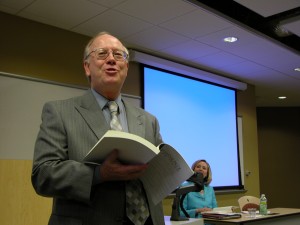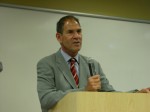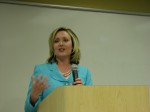
Phoenix Mayor Greg Stanton, center, speaks, alongside fellow panelists Grady Gammage, Jr., and Christina Sandefur. Phoenix, Ariz., March 20, 2013.
It doesn’t take much to frighten people. In fact, when it comes to those charged with designing livable and dynamic urban centers, all it takes is three numerals to make the blood run cold.
2. 0. 7.
As in Arizona’s Proposition 207, now enshrined at A.R.S. § 12-1134.
That law, requiring government to compensate private property owners for any diminution in value that flows from government action, makes quite a bit of conceptual sense. But according to a few panelists last night, the result of the law has been a municipal failure of nerve.
That was a message that arose at a panel discussion including Phoenix Mayor Greg Stanton. (It was sponsored by Women Design Arizona and Blooming Rock Development, and I previewed it here.)
All of the panelists were in general agreement about what the law says. But the law’s effects—especially in a city that is, as the Mayor said, among the “king of vacant lots”—drove the discussion.
“We already have one of the weakest historic preservation ordinances in the country,” Mayor Stanton said. Given that, “Isn’t it time to look at everything” that affects neighborhoods, including Prop 207?
Attorney Grady Gammage, Jr., opened by pointing out that “Arizona is not a place that’s especially hard on property owners.” Despite that, and due to a backlash against the Supreme Court case Kelo v. New London, voters opted for Prop 207. As a result, Gammage said, “Arizona is the only state that may have to compensate when any incidence of government action may alter a property’s value.”
Flowing from that, Gammage and the Mayor agreed, we’ve witnessed a “chilling effect” in city halls. Fearing lawsuits, city attorneys and the councils they advise live by the admonition, “Don’t do anything unless you can get everyone to sign a waiver of their Prop 207 rights.” And Gammage—a development lawyer and historic-property advocate—added, people never like to sign that document, so “it’s screwed up our ability to get development done.”
Disagreeing on the direness of the situation was Christina Sandefur, a Goldwater Institute attorney. She pointed out that cities may still regulate as much as necessary for health and safety. And if there are instances in which even small decreases in property value must be compensated, what’s the moaning about? Pay the small amount.
During the Q&A, the topic of waivers arose again. And for me, that led to some musing on what it means to be an effective lawyer. First, the waivers.
Gammage explained that there are two kinds of Prop 207 waivers. The first is called a Section I (as in i) waiver. It is sought in advance of any kind of development change. Municipal attorneys most often want these signed by all affected neighbors. And in the example of attempts to designate a neighborhood historic, those attorneys usually advise city councils that the neighborhood opinions must be unanimous.
As Gammage said, “We don’t do nothin’ without it.”
But, he added, there is an alternative: the Section E waiver. With that waiver, government does the best planning it can do to create a livable city. They make the designation, even if it’s not entirely unanimous, and then they wait to see if they receive a demand letter. In the worst case, the city may decide it’s best to waive out of the designation the one or two property owners that raise a stink.
Just like you, I’m sure, I live in a neighborhood. And in my neighborhood, 100 percent of the folks don’t agree on anything. The idea that we must stall any new ideas or development while we await the magician’s trick of unanimity means that nothing occurs—and that a city may remain the king of vacant lots.
I asked the panel if there should be changes in city attorney offices. All of the panelists were very circumspect on that question. And, to be fair to counsel, Mayor Stanton pointed out that the views of city attorneys and all staff “reflect decades of views” voiced by Council members. Lawyers follow; they don’t lead. They dispose; they don’t propose.
But as we sat in the empty lot of the Downtown Public Market, surrounded by food trucks and farm-to-table produce on a beautiful spring evening, I had to wonder.
That empty lot, and dozens of identical ones that surrounded us, are zoned for a pie-in-the-sky 500 feet of development. As Gammage pointed out, those massive structures will never be built in any of our lifetimes. And yet property owners hang onto these lots for generations, in case Phoenix suddenly morphs into Dubai.
In a Prop 207 world, panelists agreed, city leaders are unlikely to move to downzone anything, let alone declare a neighborhood historic. And so there is more and more room for food trucks.
Panelists mentioned that city attorneys are largely an elected bunch, so that may have something to do with their over-caution. But every speaker last night is an attorney, so they understand that lawyering is not an off-the-shelf commodity. Lawyers are not widgets, all identical, ever replaceable by another.
Because that’s the case, it may be worth examining who leads the law departments at the nation’s most progressive cities. Are they visionary, or belt-and-suspenders types? Do they counsel stasis and safety, or dynamism and risk-taking? Do they view their job as foreclosing the possibility of any lawsuit, however remote? Or as collaboratively problem-solving, willing to offer a variety of options and best practices?
Gammage alluded to those kinds of possibilities, including “creating attractive alternatives to property owners. Provide them benefits they can opt into.”
Yes, council-folk and mayors lead cities. But surrounding yourself with creative staff may help you get a city you’re proud of.
Until then, panelists concluded, we lumber on with our overriding fear of litigation, and a chilling effect that hampers development.

 Those also up for the job had ample experience as appellate judges, which the new Justice lacked. That, plus his previous advocacy litigation, meant that his selection was not met with unanimous positive reviews. (for a negative take, here is E.J. Montini’s column in the Arizona Republic.)
Those also up for the job had ample experience as appellate judges, which the new Justice lacked. That, plus his previous advocacy litigation, meant that his selection was not met with unanimous positive reviews. (for a negative take, here is E.J. Montini’s column in the Arizona Republic.)













